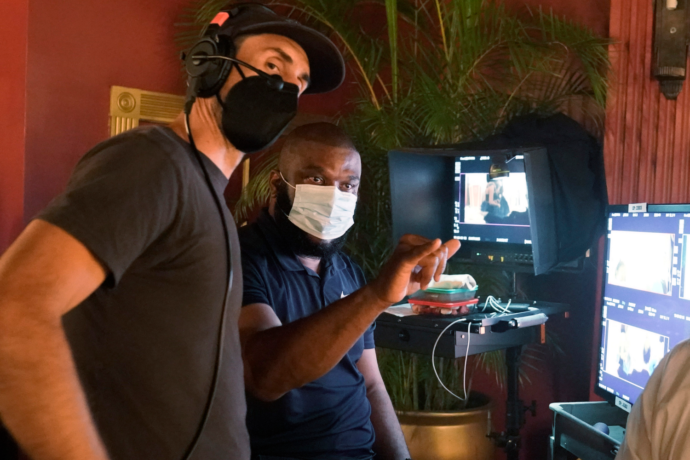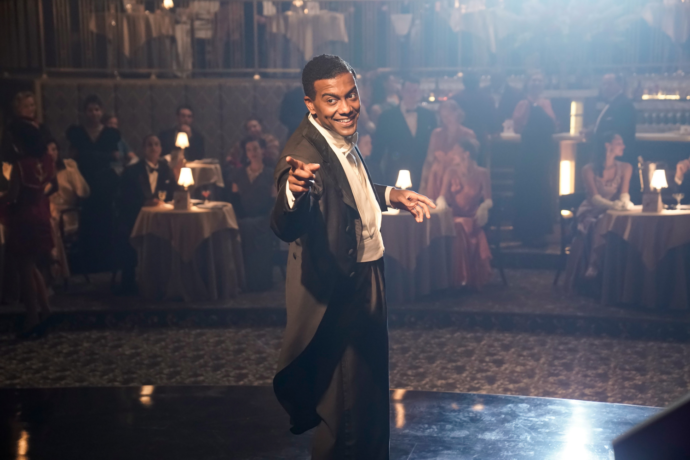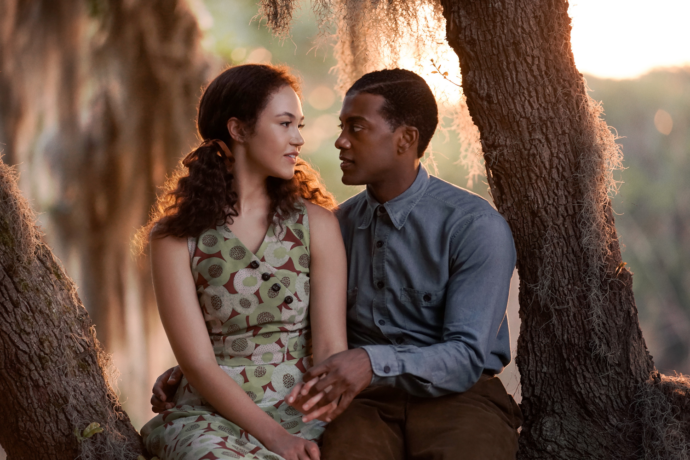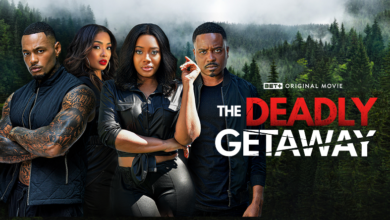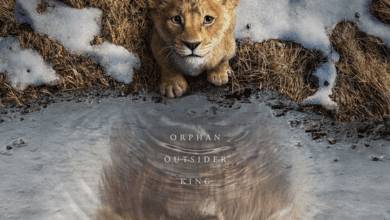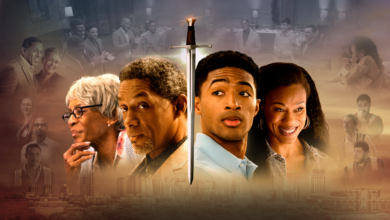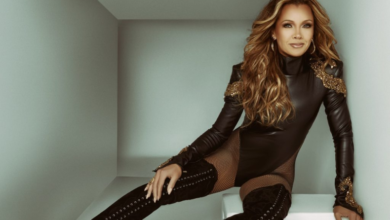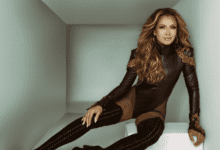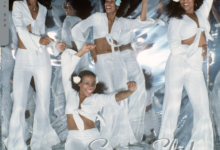UB Preview + Tyler Perry & Cast Talk ‘A Jazzman’s Blues’
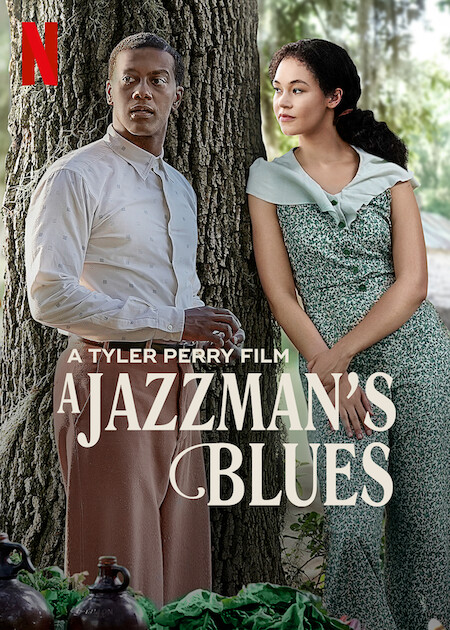
The highly anticipated “A Jazzman’s Blues” premieres September 23rd, only on Netflix. Written, directed and produced by Academy Award honoree Tyler Perry.
The passion project, that uncovers a story of forbidden love, deceit and a secret. “A Jazzman’s Blues” was originally written by Tyler 27 years ago.
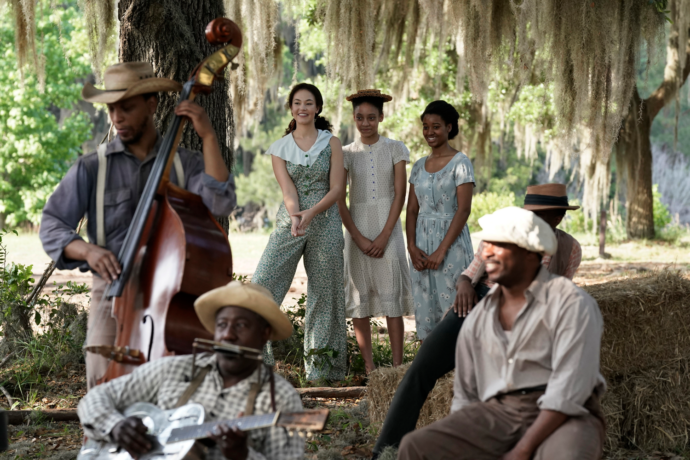
The film stars Joshua Boone and Solea Pfeiffer as star-crossed lovers Bayou and Leanne alongside Amirah Vann, Austin Scott, Milauna Jemai Jackson, Brent Antonello, Brad Benedict, Kario Marcel, Lana Young and Ryan Eggold.
The film features an original song performed by Ruth B., songs arranged and produced by multi-Grammy winner & two-time Academy Award nominee Terence Blanchard, music by Aaron Zigman and choreography by Debbie Allen.
“This is the very first thing that I wrote and I’ve waited a long time to make it. But it is happening at the right time because it was meant for Solea Pfeiffer and Joshua Boone to do and it gave me time to grow as a director,” stated Tyler Perry. “I’m celebrating that all the way around and understanding that Joshua and Solea mirror everybody — the cast and crew — in terms of quality. Everybody just brought their A-game.”
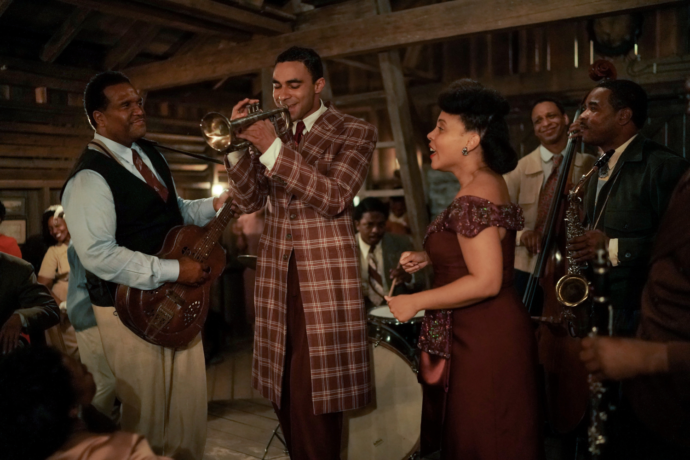
A sweeping tale of forbidden love, “A Jazzman’s Blues” unspools forty years of secrets and lies soundtracked by juke joint blues in the deep South.
Tyler Perry + Solea Pfeiffer & Joshua Boone Talk “‘A Jazzman’s Blues!”
You’ve had this story in your back pocket for a long time. What was the original catalyst for the idea and how did it involve August Wilson?
Tyler Perry: Many years ago Seven Guitars was playing at the Alliance Theatre in Atlanta and I couldn’t afford to go, so I snuck in at intermission. There was an after party where I got a chance to sit down with August Wilson and I told him what I wanted to do – all my hopes and dreams. He was very encouraging of the story that I wanted to write, so I went home and started writing A Jazzman’s Blues that night. I had this story for a while, but his way of storytelling in Seven Guitars was very inspirational to me. He was explaining how all things are art and I should absolutely go for it. He was very, very kind. You have a very fresh face in Solea Pfeiffer, an accomplished stage actress playing her first film role as Leanne. And though Joshua Boone is more seasoned this is certainly one of his largest roles to date. Why were they just right for Leanne and Bayou?I’ve always been known for breaking new talent and I didn’t want Jazzman to be any different First of all, I was blown away when I saw Solea, I thought, “Oh my God, this is Leanne.” I saw it immediately. And to see the level of talent that she was able to bring to it was really phenomenal. Then to have Joshua come along and be as brilliant as he is and have this level of, just not only acting as a talent, but just the way he was able to become and settle into Bayou, blew my mind. And then on top of that, he could sing! The whole cast is amazing. Ryan Eggold who I worked with in The Single Moms Club, Amirah Vann, Austin Scott. For actors to train and study and dive into and get every inch and iota of what a character is, I just don’t see a lot of young talent doing that and these guys and girls were phenomenal at it. That’s why I was able to paint so many colors.
Given how long you have had this idea, it is an interesting time to release A Jazzman’s Blues considering how timely so many of its issues are. How does it feel to be releasing it in this moment?
Tyler Perry: It’s a wonderful feeling, but also it’s tragic in the sense of, it showed up again in my life and I’m doing it at a time when there are so many people who are trying to eliminate the truth of the history of us as African American people. Some people who saw it said to me, “It’s a love story, but it’s so tragic.” And I was explaining to them, “Well, for us as Black people in America, a lot of our love stories at this time were tragic. We didn’t have the option to run away and live happily ever after. There were many things we had to overcome.” So I don’t want to water down our history or do away with it because I think it’s very important that we remember and acknowledge it and understand it.
Visually, the film is evocative of the sultriness and humidity of the South while capturing its natural beauty. Where did you shoot and what was the aesthetic you were trying to capture?
Tyler Perry: All of the interiors were shot at my studio and all of the exteriors were shot in Savannah and Macon, Georgia. And yes, there’s just something about Spanish moss on an oak tree, blowing in the wind that tells the story within itself. And to understand that these trees that we were shooting amongst lived during this time. They bear witness to what it was really like, so dropping these houses and these sets inside of that kind of history of trees around us, it really helped to tell the storyDo you think the film actually taking so long to come to fruition actually helped in terms of honing your skills as a director?
Tyler Perry: Yes, I’m glad I didn’t do it 10, 20 years ago. It took the years of experience I had of being behind the camera and really understanding what that meant. It took working with directors like David Fincher and Adam McKay to really understand just the power of using the camera to tell a story. For me, in the beginning of my career, it was just about using the camera to tell the story, but I didn’t necessarily use it as a paintbrush. And my cinematographer Brett Pawlak, he read the script, we talked about it, I told him what I wanted it to look like and what I wanted it to feel like and he was absolutely brilliant in understanding it and helping me paint the image.You also got to work with your buddy Debbie Allen on the choreography. How was that experience?
Tyler Perry: I brought the script to Debbie maybe 20 years ago. She was working at Dreamworks at the time and she loved it. We tried to get it done and nothing happened at the time. But then I brought it back around to her and I said, “Listen, I’m going to do this film and I’d love for you to do choreography.” She’s like, “Are you kidding me?” So to work with a legend? It was wonderful because Debbie Allen is dance. And to have her create these incredible numbers that really sold the whole moment. I was very, very fortunate to get that opportunity.What do you hope viewers take away from the film?
Tyler Perry: The story and the passion of these people. And even though it’s a fictional movie to understand that these people actually existed, these struggles were common, these things actually happened. And if there’s a reverence for the past and we shouldn’t let anyone whitewash it and turn it into something that it wasn’t. If people start to realize how important it is that we maintain and tell these kinds of stories, then I think that it would be all that I want it to be.
This was your first movie, and your first movie is with Tyler Perry. Tell me about that experience, working with Tyler and getting to know the movie business through him.
Solea Pfeiffer: It was intense. After I got the part, there was just that feeling of “Oh shit. I have to do a lot of things I’ve never done before.” I remember the day before we started shooting I was just staring at the ceiling, with adrenaline coursing through my body. I think it really was a huge benefit to come from the stage world before working with Tyler, because Tyler works super efficiently. You don’t build an empire like he has, and you can’t be as prolific as he has been without knowing how to make movies efficiently. It was this amazing artistic challenge, and it meant from the moment you step on set you are dropped into character, you are ready, you know what’s happening. I got an absolute crash course in what it means to be the lead of a film. It was about coming into the experience, and telling myself every day, “You don’t know what you don’t know. Take a bite of the humble pie when you need it, but recognize that Tyler Perry created this character out of thin air and chose you. So, what you are instinctively bringing to the table, if he’s happy with it, trust that.” It was amazing. For any artist, there’s nothing like getting pushed. It felt so far out of my comfort zone, but after this process I feel like I can do anything.What was your initial reaction to the script, to the character, to the idea of working with someone like Tyler Perry?
Joshua Boone: I respect Mr. Perry immensely. What he’s built as a Black man in this country, people recognize it, but I don’t know if exactly what he’s done and what he’s doing in this country as a Black man is really honored or talked about enough. You might be hard pressed to name five people who’ve done what he’s done in this business, in every capacity: writer, director, producer, studio owner, actor. There are some who’ve done portions of that but he’s literally done it all. I grew up his biggest fan, but I didn’t know if our artistry would align until I read that script. And I was like, “Oh man, he’s up to something, and hopefully by getting to meet him, maybe we’ll see if our visions align.” They did, and he was so patient with me and gracious towards me throughout the entirety of the process, from the audition all the way through to when they called wrap. I learned so much from him. Just reading the script, especially with the singing, I knew that this was my strongest opportunity thus far. I read it and I could just hear Bayou’s voice and feel that energy, and I felt where he wanted to go.
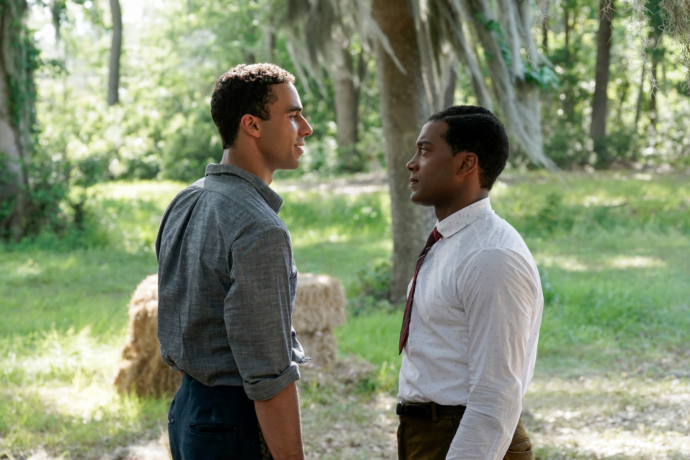
Last night the film opened the 2022 Toronto International Film Festival for its premiere, in which Oprah Winfrey attended.
Check Out UB Previews of “A Jazzman’s Blues!”

